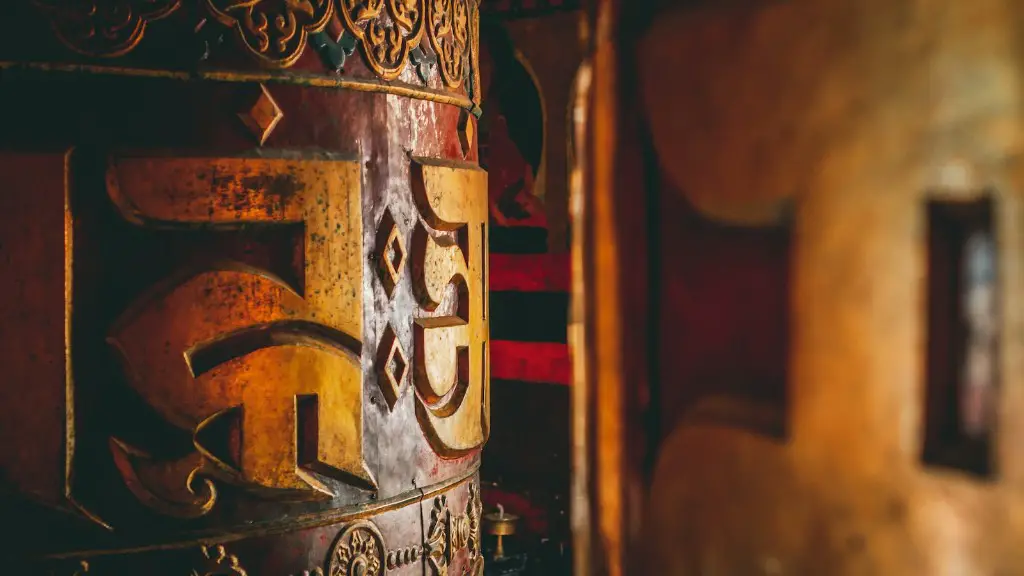The Origins of Hinduism
Hinduism is the world’s oldest living religion and has billions of followers. It is based on ancient scriptures and beliefs and its main principle is spiritual salvation through living a virtuous life. Over the years, Hinduism has evolved and reformed, taking on many different forms throughout its long history. But who is the creator of Hinduism?
Vedic Religion and Its Development
The origins of Hinduism have their roots in the Vedic religion, which was the sacrificial religion of ancient India. This religion was based on the Vedas, a set of ancient scriptures written in archaic Sanskrit. Over time, as the culture changed and evolved, various sects of Hinduism began to emerge.
One of the most influential Hindu sects was Vaishnavism, which placed great emphasis on devotion and worship of the gods. Vaishnavism was based on the teachings of the Bhagavad Gita, the most popular Hindu scripture.
The Trimurti and It’s Three Forms
The Trimurti is the triad of highest gods worshiped by Hindus. Thistrinity comprises three forms, namely Brahma the Creator, Vishnu the Preserver, and Shiva the Destroyer. While Vishnu is believed to be the supreme god of Hinduism, Brahman is considered to be the force behind the universe and the source of all creativity.
The Four Yugas and the Cycle of Time
Hinduism is based on an ancient concept known as ‘the four Yugas’, which is a cycle of time that marks the beginning and end of an era. According to Hindu belief, the world is created and destroyed every four Yugas and this cycle of creation and destruction is overseen by the three gods of the Trimurti.
Krishna, Rama and the Avatars
Krishna and Rama are two of the most popular incarnations of the god Vishnu. In Hinduism, the gods can take the form of mortals known as ‘Avatars’. According to Hindu mythology, Krishna and Rama were two of the most important Avatars of Vishnu, and their stories are expressed in great detail in the Bhagavad Gita and the Hindu epic Ramayana.
Ideas about the Creator
Hinduism does not have one single creator, but instead it is believed that there is a divine being responsible for the creation of the universe. This divine being is referred to as Brahman, and is said to be the ultimate source of all existence. Hindus believe that the universe is constantly in a cycle of creation and destruction, and that the gods of the Trimurti help to oversee this cycle.
Hindu Symbols and Beliefs
Hinduism is steeped in culture, traditions, and symbols. Hindus believe in reincarnation and karma, and they follow an ethical code known as Dharma. Hindus also have many gods and goddesses that they worship, and these gods and goddesses are all part of the Trimurti.
Hinduism also has a strong symbolism and iconography. Images of the gods and goddesses, the lotus flower, and the Om symbol are all used to represent the Hindu faith. The Swastika is another important symbol of this religion, which is an ancient image said to represent the gods and to bring good luck.
The Impact of Hinduism
Hinduism has had a huge influence on the culture and politics of India. The caste system, a social structure which delineates the different classes of Hindu society, is based on Hindu beliefs and is still very much in existence today. Indian art, literature, and music have also been heavily influenced by Hinduism and the Vedic scriptures.
Hinduism has also spread to many other parts of the world, particularly in countries such as Nepal, Singapore, and the United States. This religion has had an influence on the beliefs and practices of many of these countries and has helped to shape the culture and values of these places.
Modern Hinduism
Modern Hinduism is significantly different from the Vedic religion of old. While the Vedic religion was a sacrificial religion, modern Hinduism is based on more internalized forms of worship such as contemplation, meditation, and prayer. The Vedic scriptures are still considered to be sacred and the main texts of modern Hinduism, but the religion has since evolved to incorporate beliefs and practices from other faiths.
The originator of modern Hinduism is unknown, but the religion has evolved over time and has been heavily influenced by many different people and cultures. It cannot be attributed to one single deity or person, as it has been shaped and molded by many different forces over its long history.
Practices and Rituals of Hinduism
Hinduism is a religion of rituals and practices. Hindus practice various forms of worship such as prayer, meditation, chanting, and sacrifice. Rituals such as puja, festivals, pilgrimage, fasting, and meditation are also important elements of Hinduism.
The puja ritual involves the offering of flowers and offerings to the gods and goddesses, as well as prayers and chanting of mantras. Festivals are an important part of Hinduism and there is a great variety of festivals celebrated throughout the year. Pilgrimage is also an important part of this religion, and Hindus often visit holy sites such as Varanasi, Haridwar, and Rishikesh.
Conclusion
Hinduism is an ancient religion with a long and complex history. Its origins are rooted in the Vedic religion and its main principle is spiritual salvation through living a virtuous life. The Trimurti of highest gods, the four Yugas and their cycle of time, the Avatars of Vishnu, and many other ideas form the framework of Hinduism.
Symbolism and iconography are important elements of Hinduism, and the gods and goddesses, the lotus flower, and the Om symbol are all used to represent the faith. Hinduism has had a huge influence on the culture, politics, and values of India and many other countries. Rituals and practices such as puja, festivals, pilgrimage, and meditation are an integral part of Hinduism, and this religion continues to be practiced and celebrated around the world today.
